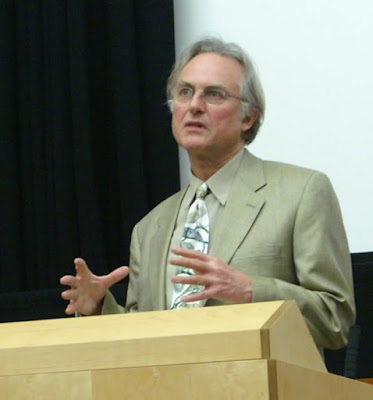I got into a curious exchange with someone on Twitter a couple of days ago about Richard Dawkins's recent statement that "biological sex is binary, and that's all there is to it," wherein he called the claims of trans people (and their requests to be referred to by the pronouns they identified with) "errant nonsense," and characterized the people who have criticized him and author J. K. Rowling (amongst others) for their anti-trans stances as "bullies."
The person I had the exchange with seemed to consider this a gotcha moment, and came at me with a gleeful "what do you think of your atheist idol now that he's broken ranks?"
I found this a puzzling question from a number of standpoints. First, I've never idolized Dawkins. I think he is an incredibly lucid writer on the subject of evolutionary biology, and his books The Blind Watchmaker, Climbing Mount Improbable, and The Ancestor's Tale remain three of the best layperson's explanations of the science and evidence behind evolution I've ever read. But admiring his writing on one topic doesn't mean I think he's infallible. In fact, I've always had the impression that Dawkins was a bit of a dick, and he certainly comes across as more than a little arrogant. While I agree with him on the subject of evolution, it doesn't mean that he's someone I'd particularly want to have a beer with.
When I responded to the question with something like this, the person on Twitter seemed a bit deflated, as if he'd expected me to alter my stance on LGBTQ+ issues and the biology of gender just because My Hero had made some sort of pronouncement from on high.
This struck me as a peculiar reaction. Maybe this is how it works within the context of religion, where a leader (e.g. the Pope, the Imams, and so on) makes a statement and the expectation is that everyone will simply accept it without question.
But it's definitely not how things go in science.
In this case, it has nothing to do with Dawkins bucking the system against some kind of perceived party line. In fact, I'll bring out one of his own quotes, which applies here: "If two people are arguing opposite viewpoints, it is not necessarily the case the the truth lies somewhere in the middle. It is possible that one of them is simply wrong." On the subject of sexuality being binary, Dawkins is simply wrong, something I explored in some detail in a post a couple of years ago.
But the point is, that doesn't detract from his excellent writing on evolution. Being wrong about one thing, or even about a bunch of things, doesn't mean you're wrong on everything, nor invalidate other outstanding work you may have done. (Although it can rightly tarnish your reputation as a decent human being.) It's sad that Dawkins has gone off the rails on this topic, and a shame that his aforementioned arrogance is very likely to make him unwilling to see his own faulty assessment of the evidence and even less likely to admit it if he does. And it's unfortunate that his air of authority is certainly going to carry some weight with people, especially those who want more ammunition for defending what they already believed about the supposed binary nature of gender.
The fact that this doesn't make me discount him completely is because I feel no need to engage in hero worship.
That extends to other areas as well. I can appreciate the acting ability of Tom Cruise and Gwyneth Paltrow, and thoroughly enjoy watching (respectively) Minority Report and Sliding Doors, while at the same time acknowledging that in real life both of them appear to have a screw loose. I can still be inspired by some of the stories of H. P. Lovecraft, while keeping in mind that he was a virulent racist (something that comes through loud and clear in the worst of his stories, but fortunately not all).
In fact, it's best if we look at all famous people through that lens. The expectation that someone prominent or admired must be flawless -- and therefore, anyone criticizing him/her is de facto wrong -- is what leads to the behavior we're now seeing in Trump loyalists, who will defend him to the death regardless what charges are proven against him or how overwhelming the evidence is.
It is this sort of thinking that is characteristic of a cult.
In any case, I can say I'm disappointed in Dawkins, but it neither caused me to abandon his writing on evolutionary biology nor to revise my own thinking on LGBTQ+ issues because Dawkins Says So. It's best to keep in mind that people are complex bundles of often contradictory traits, and there's no one person who is going to be in line with your understanding of the world all the time. In the end, it's always best to form your beliefs based on where the actual evidence leads -- and above all, to think for yourself.
****************************************


